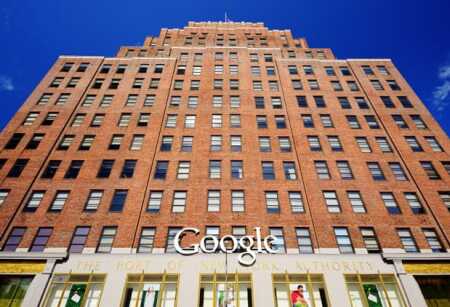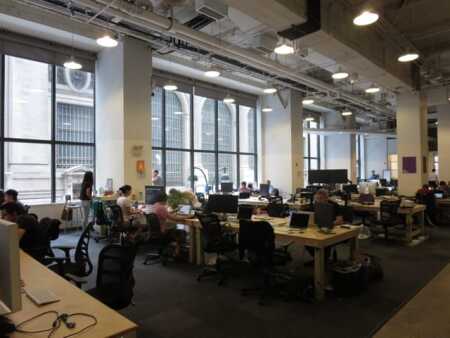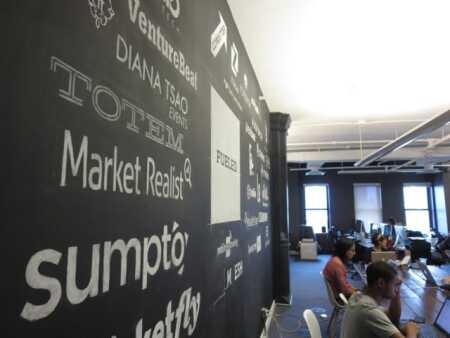As New York City’s burgeoning tech economy continues to grow, startups face the same challenges for office space they would anywhere else—but have the added challenge of Manhattan-level price tags, vying for space with law firms, banks, and other well-financed tenants.
An absolute lack of space is not the issue, however. New York’s low 10 percent office vacancy rate may be second only to Washington, D.C.’s 9.6 percent, but an enormous amount of inventory is going up—7.7 million square feet (715,000 sq m) of space was on the way in early August, the second-largest citywide total in the country.
But demand remains strong. In the first half of 2014, Jones Lang LaSalle (JLL) tracked more than 2.6 million square feet (241,500 sq m) of lease commitments by tech firms alone citywide; in Manhattan itself, those deals approached 15 percent of the office inventory leased in that borough.
Related: Register for the ULI Fall Meeting in NYC
Blockbuster deals like Google’s $1.9 billion purchase in 2010 of a full-block office building in the Chelsea neighborhood—with nearly 3 million square feet (279,000 sq m) of space, conveniently sitting atop trunk fiber-optic lines—no longer seem as easy to come by. JLL recorded only six tech leases for more than 100,000 square feet (9,300 sq m) over the first half of 2014.
For the very smallest startups, even 1,000 square feet (93 sq m) is often more than they require. They just need more room than an apartment offers, ideally allowing for a chance to work alongside other entrepreneurs dealing with some of the same problems.
Here, the city’s real estate and tech industries have stepped up with a wide variety of coworking spaces and startup incubators, all offering that rarity in New York real estate: cheap or even free space to get started.
One common trade-off is equity. That’s the deal with the Entrepreneurs Roundtable Accelerator (ERA), an incubator that has been hosting startups since March 2011.
Accepted companies get $40,000 in funding, four months’ free office space and business and legal service, access to its network of mentors, and a chance to pitch themselves to investors at ERA’s annual Demo Day. In return, ERA takes 8 percent common stock in each company.
During an April visit to ERA’s Chelsea confines, managing director Jonathan Axelrod said that ERA looks for “by New York, for New York” companies—meaning those with a connection to such New York City specialties as commerce, media, fashion, and sports.
Earlier this summer, Grand Central Tech (GCT) launched with a different sort of free-for-now pitch. The 19 startups accepted out of some 500 that applied get a full year of rent-free space in GCT’s 15,000-square-foot (1,400 sq m) space across the street from Grand Central Terminal, with no need to give up equity.
But at the end of that year, they are expected to sign up for office space elsewhere in that Milstein Properties–owned building, at rates that cofounder Charles Bonello would only describe as “competitive.” (Average quoted rates in midtown in the second quarter of 2014 were around $59 per square foot [$635 per sq m], according to the Costar Group.)
GCT’s plain space may not have the charm of downtown loft buildings, but it does offer fantastic transit connections. Bonello noted a less obvious bonus: “This was Facebook’s New York headquarters, so we have all of their wiring. Nothing goes down, ever.”
A third kind of proposition is on the table for startups in one of those quainter, older spaces, SoHo-based Fueled Collective. Here, 30-odd startups pay a flat rate of $700 per desk per month, with a three-month minimum.
These tenants don’t get the usual mentorship arrangements—“The relationship we have is very much tenant and landlord,” said manager Ele Bernstein—but they have the chance to learn from each other’s experience.
They also get to work in one of the more interesting spaces around, done up in a sort of retro Anglophilia—think comfortably worn leather sofas and chairs, a wall of worn crates holding jars with snacks of various kinds, an upright piano, and conference rooms named after London neighborhoods.
Like ERA and GCT, Fueled Collective requires startups to interview to get a spot in what Bernstein called a “highly curated” space.
Startups that outgrow these hubs, however, can find themselves in an awkward spot, with not much inventory available for early-stage companies. That is especially the case in hot neighborhoods like the Flatiron and SoHo districts.
“If you’re a five- to seven-person company looking for some kind of space, there is nothing!” said David Mandell, cofounder of PivotDesk. His company helps tenants sublet unused shadow space without a long-term commitment—a proposition he called “Match.com for businesses.”
That fear of commitment is a rational anxiety for companies with uncertain prospects. “Betting your life on a five- or ten-year lease right now is a dangerous thing,” Mandell said.
Over at ERA, Axelrod wrote in an e-mail that “most startups would prefer a shorter lease, and a two-year term as a template would be fine from my vantage point.” He suggested the city could help by sitting down with major landlords to work out a two- to three-year standardized lease for certain buildings that the city could then certify and tout as startup-friendly.
The municipal government, for its part, has refrained from directly underwriting startup spaces in the way that, for example, Washington, D.C.’s mayor has given direct financial support by way of grants to 1776, a startup accelerator, hoping to establish a new tech corridor in the downtown area.
The New York City Economic Development Corporation has, however, backed a variety of projects to connect employers and students (its “Generation Tech” helps high-schoolers study programming, develop business plans, and learn from mentors) and help businesses find broadband (its broadband map can clue property owners and tenants to alternatives to Verizon and Time Warner Cable).
That still leaves startup founders to deal with the high cost of living. That is not going away anytime soon, but there are reasonable odds that some of the startups in these coworking and incubator spaces will concoct sites and apps to make residential transactions a little less painful.







